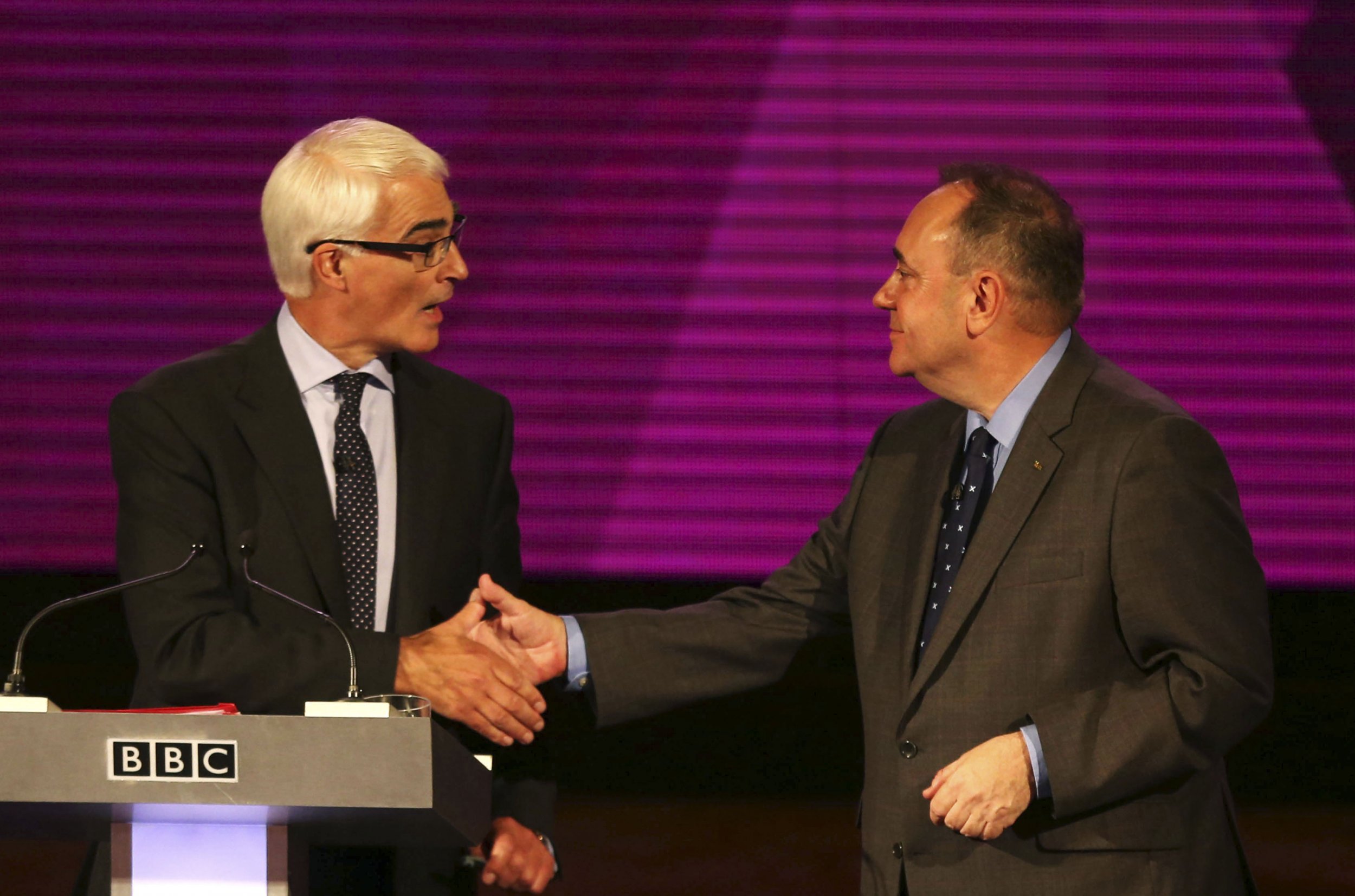
Scotland's pro-independence leader Alex Salmond won a final TV debate on Monday just over three weeks before a historic breakaway referendum, but it wasn't clear if his combative performance would help him catch up in the polls.
In a bruising debate before the Sept. 18 referendum, Salmond relentlessly talked over and at Alistair Darling, the leader of the "Better Together" anti-independence movement, and it was sometimes hard to hear what was being said.
With the campaign to break up the United Kingdom and sever Scotland's 307-year union consistently trailing in opinion polls by an average of up to 14 percentage points, Salmond's supporters were looking for a game-changing performance after he failed to sparkle in the first such encounter.
Salmond, 59, did much better this time.
In a snap Guardian/ICM poll released soon afterwards, 71 percent of over 500 respondents judged that Salmond had won, against 29 percent who said they thought Darling had triumphed.
Professor John Curtice of Strathclyde University, a polling expert, also deemed Salmond had won. But he questioned whether the nationalist leader's rhetorical victory would translate into a win at the ballot box.
"A debate doesn't necessarily win you votes," said Curtice, saying it had been notable for its lack of proper discussion about wider economic questions.
"My glance at the flash poll is that while Salmond was the obvious winner, it doesn't seemed to have moved votes at this stage," he said.
Salmond got more cheers in Glasgow, Scotland's biggest city, than Darling, 60, who attracted the odd groan.
But Salmond didn't advance new arguments or land a knock out blow. Instead, over the course of a scrappy hour-and-a-half, he repeatedly interrupted Darling and asked him the same few questions time and time again, a tactic which unsettled the former British Chancellor who at times audibly struggled to find a riposte.
"The eyes of the world are indeed focused on Scotland," Salmond told the audience in an emotional opening statement, urging Scots to vote for full independence. "This is our time, our moment. Let us do it now."
Scotland's health service would be better off under independence, he argued, questioning whether the British government would give Scotland more devolved powers in the event that Scots reject independence.
Scotland already has its own parliament with control over policy areas such as education and health.
FUNDAMENTAL QUESTION
Salmond was helped by sympathetic audience members who heckled Darling, including one woman who told the audience not to trust a word that came out of Darling's mouth.
Last time, Salmond came unstuck on the issue of what the currency arrangements would be for an independent Scotland. He advocates a formal currency union to allow it to use the pound, but has struggled to explain what he would do if what was left of the UK refused.
All three major UK-wide parties have ruled out such a union; Salmond predicts that would change if there was a "yes" vote.
This time round, Salmond was more confident if equally vague on the currency issue.
"I want a mandate so we can go in with the will of the Scottish people, for the common sense option of a currency union," he said.
"We cannot be stopped from using the pound anyway," he argued, to loud applause from supporters in the audience.
Darling tore into Salmond for failing to spell out a "plan B" if the British government refused to formally share the pound, calling Salmond's idea of using sterling informally "a nonsense option".
"He can't answer basic questions on currency. He can't answer basic questions on tax and spend," said Darling.
Trusting Salmond and his promises, which he argued wouldn't provide Scotland with a sustainable future, was too risky a prospect, said Darling.
"He's asking us to take his word for it. Well, I'm sorry I can't," he said.
The two men also clashed over how much oil was left in the North Sea and about the merits of siting Britain's nuclear deterrent in Scotland.
Darling repeated the anti-independence campaign's slogan, telling Scots they could have the "best of both worlds".
"We do not need to divide these islands into separate states in order to assert our Scottish identity," he said. "I say that we all have no option other than to say politely, respectfully, but firmly, no thanks to independence."
Several recent polls have shown support for independence climbing a few points, but the most recent "poll of polls," on Aug. 15, which is based on an average of the last six polls and excludes undecided respondents, found support for a breakaway stands at 43 percent against 57 percent for staying in the UK.
Uncommon Knowledge
Newsweek is committed to challenging conventional wisdom and finding connections in the search for common ground.
Newsweek is committed to challenging conventional wisdom and finding connections in the search for common ground.
About the writer
To read how Newsweek uses AI as a newsroom tool, Click here.








